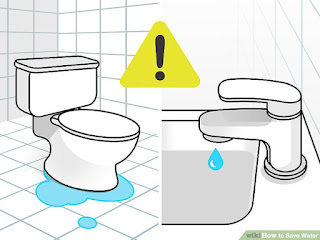Conserving water is crucial for both the environment and your wallet.
Saving water is essential for conserving this precious resource and reducing the strain on our environment. Here is a description of how to save water
Fix Leaks:
Regularly check for and repair leaks in faucets, toilets, and pipes. A small leak can waste a significant amount of water over time.
Install Water
-Efficient Fixtures: Consider installing low-flow faucets, showerheads, and toilets. These fixtures use less water while providing the same level of performance.
Use a Broom, Not a Hose:
When cleaning driveways, sidewalks, or decks, use a broom instead of a hose to save water.
Collect Rainwater:
Install a rain barrel to collect rainwater for outdoor watering. This can be used to water your garden, plants, or lawn.
Watering Plants Efficiently: Water your garden or lawn early in the morning or late in the evening when temperatures are cooler to reduce evaporation. Use a soaker hose or drip irrigation system to target the roots directly, minimizing water wastage.
Mulch Your Garden:
Applying mulch to your garden beds helps retain moisture, reducing the need for frequent watering.
Don't Leave Taps Running:
Turn off the tap while brushing your teeth, washing your face, or doing dishes. Only run the tap when you need it.
Opt for Full Loads:
When using the dishwasher or washing machine, make sure you have a full load to maximize water efficiency.
Shorter Showers:
Try to take shorter showers and consider installing a low-flow showerhead to reduce water usage.
Reuse Water:
Consider reusing water from activities like washing fruits and vegetables or cooking pasta to water your plants.
Upgrade Appliances:
When it's time to replace appliances like washing machines or dishwashers, choose models that are energy and water-efficient.
Adjust Lawn Mower Height:
Set your lawn mower blades to a higher cutting level. Taller grass retains moisture better than shorter grass.
Educate and Involve Your Family:
Teach your family members about the importance of water conservation and involve them in your efforts.
Insulate Pipes:
Insulate hot water pipes to reduce the time it takes for hot water to reach the tap, which can also save water.
Monitor Your Water Usage:
Keep track of your water bills and usage to identify any unusual increases that may indicate leaks or excessive use.
Xeriscaping:
Consider xeriscaping your yard with drought-tolerant plants that require less water.
Use a Pool Cover:
If you have a swimming pool, use a cover to reduce evaporation and the need to top off the water.
Be Mindful of Water Footprint:
Be conscious of the water footprint of the products you consume, including food and goods. Reduce consumption of products with high water footprints.
Support Water-Efficient Policies:
Advocate for and support policies and initiatives that promote water conservation at the community and government levels.
Educate Others:
Spread awareness about the importance of water conservation within your community and among friends and family
Conclusion
Every drop of water saved makes a difference, so incorporating these practices into your daily routine can contribute to water conservation efforts and help ensure a sustainable water supply for the future.



.jpg)
Comments
Post a Comment